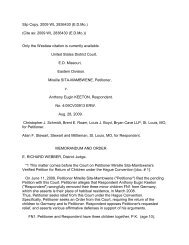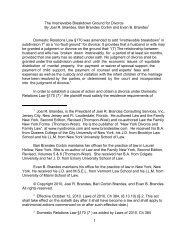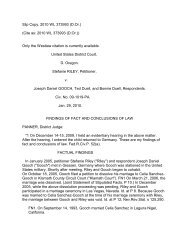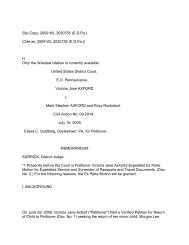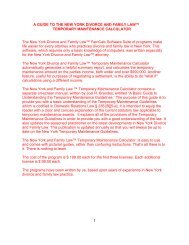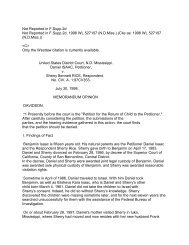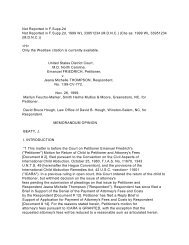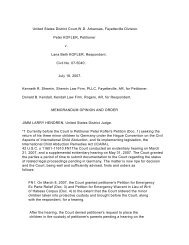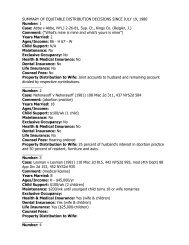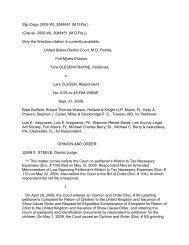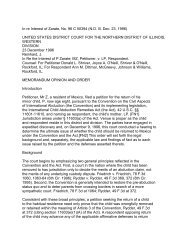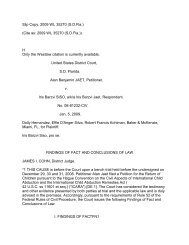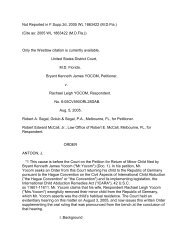In re Roux v. Roux
In re Roux v. Roux
In re Roux v. Roux
You also want an ePaper? Increase the reach of your titles
YUMPU automatically turns print PDFs into web optimized ePapers that Google loves.
United States District Court,D. Arizona.<br />
<strong>In</strong> <strong>re</strong> the Application of George August ROUX, Petitioner,<br />
v.<br />
Melody Judith ROUX, Respondent.<br />
No. CV 06-2203-PHX-JAT.<br />
Feb. 2, 2007.<br />
Walter Anthony Angelini, Angelini & Angelini Law Offices, Weirton, WV, for Petitioner.<br />
Leslie I. Tennen, Law Offices of Sterns & Tennen, Phoenix, AZ, for Respondent.<br />
ORDER<br />
JAMES A. TEILBORG, United States District Judge.<br />
*1 Pending befo<strong>re</strong> the Court is Petitioner's Petition to Return Child<strong>re</strong>n to Petitioner (Doc.<br />
# 1). On February 1, 2007, the Court p<strong>re</strong>sided over a hearing on this matter. At the<br />
hearing, Petitioner George August <strong>Roux</strong> ("Petitioner"), Petitioner's mother, Sigrid<br />
Wosnak, and Respondent Melody Judith <strong>Roux</strong> Stern testified. After consideration of the<br />
testimony and documentary evidence p<strong>re</strong>sented, and for the following <strong>re</strong>asons, the<br />
Court denies Petitioner's Petition to Return Child<strong>re</strong>n to Petitioner.<br />
I. Background<br />
Sometime in 1999, after meeting on the <strong>In</strong>ternet, Respondent, a United States citizen,<br />
traveled to Canada and began living with Petitioner, a Canadian citizen.<br />
Petitioner and Respondent <strong>re</strong>sided in an apartment located in the basement of the<br />
house owned by Petitioner's mother. The house was located in Sur<strong>re</strong>y, British<br />
Columbia, Canada. On September 22, 2000, Petitioner and Respondent we<strong>re</strong> married<br />
in Canada. While both Petitioner and Respondent we<strong>re</strong> <strong>re</strong>siding in Canada, two child<strong>re</strong>n<br />
we<strong>re</strong> born of the marriage. On January 15, 2002, Rosemary Renate <strong>Roux</strong> was born.<br />
On September 10, 2003, Shaila Ann <strong>Roux</strong> was born.
On June 22, 2004, Respondent, along with both child<strong>re</strong>n, traveled to Arizona to visit<br />
family and possibly donate a kidney to her brother. <strong>In</strong> July 2004, Respondent had<br />
decided to stay in Arizona with the child<strong>re</strong>n. <strong>In</strong> October 2004, Respondent, alone,<br />
<strong>re</strong>turned to Sur<strong>re</strong>y, British Columbia, and informed Petitioner of her desi<strong>re</strong> for a divorce<br />
and her intention to <strong>re</strong>main in Arizona with the child<strong>re</strong>n.<br />
<strong>In</strong> late November 2004, Petitioner <strong>re</strong>quested that Respondent <strong>re</strong>turn the child<strong>re</strong>n to<br />
Canada. Respondent complied. On December 6, 2004, Petitioner obtained an <strong>In</strong>terim<br />
Ex-Parte Order from the Provincial Court of British Columbia granting joint custody and<br />
guardianship of the child<strong>re</strong>n to Petitioner and Respondent and prohibiting the parties<br />
from <strong>re</strong>moving the child<strong>re</strong>n from the jurisdiction of the court. Petitioner was further<br />
orde<strong>re</strong>d to serve Respondent with a copy of the order. Petitioner testified that he<br />
served Respondent by sending a copy of the order via <strong>re</strong>giste<strong>re</strong>d mail to Respondent's<br />
mother's home in Kearny, Arizona.<br />
On January 17, 2005, Petitioner and Respondent ag<strong>re</strong>ed to an interim custody <strong>re</strong>gime<br />
and, appearing befo<strong>re</strong> the Provincial Court of British Columbia, obtained an <strong>In</strong>terim<br />
Consent Order. The order continued the joint custody and guardianship of the child<strong>re</strong>n<br />
and provided that the parties shall sha<strong>re</strong> <strong>re</strong>sidency of the child<strong>re</strong>n as follows: (a) the<br />
child<strong>re</strong>n shall <strong>re</strong>side primarily with Petitioner from December 4, 2004 to May 19, 2005,<br />
and the child<strong>re</strong>n will <strong>re</strong>side in the Lower Mainland of British Columbia while in<br />
Petitioner's ca<strong>re</strong>; and (b) the child<strong>re</strong>n shall <strong>re</strong>side primarily with Respondent from May<br />
19, 2005 to August 19, 2005, and the child<strong>re</strong>n will <strong>re</strong>side with her in Arizona. The order<br />
further provided that the only adults that may accompany the child<strong>re</strong>n during the travel<br />
to and from each pa<strong>re</strong>nts'<br />
<strong>re</strong>sidence a<strong>re</strong> Petitioner, Respondent, and Petitioner's then-girlfriend, Erin B<strong>re</strong>aley,<br />
unless otherwise ag<strong>re</strong>ed to by the pa<strong>re</strong>nts.<br />
*2 On May 16, 2005, and pursuant to the prior order, Petitioner and Respondent<br />
<strong>re</strong>turned to the Provincial Court of British Columbia at which time another <strong>In</strong>terim<br />
Consent Order was issued. The order <strong>re</strong>moved Erin B<strong>re</strong>aley as an approved travel<br />
companion for the child<strong>re</strong>n. The order also provided that the child<strong>re</strong>n shall <strong>re</strong>side<br />
primarily with Petitioner from August 19, 2005 to December 19, 2005, during which time<br />
the child<strong>re</strong>n will <strong>re</strong>side in British Columbia. The<strong>re</strong>after, from December 19,<br />
2005 to May 19, 2005, the order provided that the child<strong>re</strong>n shall <strong>re</strong>side primarily with<br />
Respondent, during which time the child<strong>re</strong>n will <strong>re</strong>side in Arizona. Finally, the order<br />
provided that the child<strong>re</strong>n shall <strong>re</strong>side primarily with Petitioner from May 19, 2006 to<br />
September 19, 2006, during which time the child<strong>re</strong>n will <strong>re</strong>side in British Columbia.<br />
The<strong>re</strong>after, according to the testimony p<strong>re</strong>sented at the hearing, Petitioner and<br />
Respondent we<strong>re</strong> to ag<strong>re</strong>e on additional sha<strong>re</strong>d custody until the child<strong>re</strong>n <strong>re</strong>ached<br />
school age.
<strong>In</strong> April 2006, Petitioner obtained new employment. His work schedule <strong>re</strong>qui<strong>re</strong>d that he<br />
work four days with th<strong>re</strong>e days off. Petitioner contacted Respondent to inform her that<br />
he would not be able to pick up the child<strong>re</strong>n on May 19, 2006, as provided in the most<br />
<strong>re</strong>cent court order, and that, instead, he wanted his mother to pick up the child<strong>re</strong>n.<br />
Because the Respondent and Petitioner's mother did not get along, Respondent<br />
<strong>re</strong>fused to ag<strong>re</strong>e to such a modification of their ag<strong>re</strong>ement and the court order.<br />
On May 16, 2006, Petitioner obtained an <strong>In</strong>terim Order-Without Notice to Others (Ex<br />
Parte) from the Provincial Court of British Columbia. The order provided that Petitioner's<br />
mother may act in place of Petitioner to pick up the child<strong>re</strong>n. The order also provided<br />
that Respondent "has liberty to apply to change or cancel this Order upon 7 clear days<br />
notice to [Petitioner]." This order was not served on Respondent. <strong>In</strong>stead, Petitioner's<br />
mother drove to Arizona, arriving on May 20, 2006, and p<strong>re</strong>sented the order to<br />
Respondent's mother (Petitioner testified he did not have Respondent's home add<strong>re</strong>ss).<br />
Petitioner's mother <strong>re</strong>quested that the order be passed along to Respondent.<br />
The<strong>re</strong>after, Petitioner's mother checked into a hotel room and, a day or so later,<br />
traveled back to Canada without the child<strong>re</strong>n.<br />
According to Respondent, after she <strong>re</strong>viewed the order allowing Petitioner's mother to<br />
pick up the child<strong>re</strong>n, she contacted Petitioner and informed him that she objected to the<br />
order. The<strong>re</strong>after, neither Petitioner nor his mother made any further attempts to pick<br />
up the child<strong>re</strong>n either by <strong>re</strong>turning to Arizona to pick up the child<strong>re</strong>n or by contacting<br />
Respondent to discuss the matter.FN1<br />
FN1. Petitioner admitted on the stand that he could have traveled to Arizona<br />
during his th<strong>re</strong>e days off work to pick up the child<strong>re</strong>n, and that this<br />
probably would have been only a couple of days after the actual exchange<br />
date set forth in the May 16, 2005 consent order. Likewise, Respondent<br />
testified that she would have <strong>re</strong>leased the child<strong>re</strong>n to Petitioner had he,<br />
instead of his mother, traveled to Arizona to pick up the child<strong>re</strong>n.<br />
On May 29, 2006, Petitioner began the process of seeking the child<strong>re</strong>n's <strong>re</strong>turn to<br />
Canada under the Hague Convention on the Civil Aspects of <strong>In</strong>ternational Child<br />
Abduction, opened for signatu<strong>re</strong>, October 25, 1980, T.I.A.S. No. 11,670, 1343 U.N.T.S.<br />
89 (the "Convention"). This process led to Petitioner filing his Petition to Return Child<strong>re</strong>n<br />
to Petitioner in this Court on September 15, 2006. <strong>In</strong> the Petition, and at the hearing,<br />
Petitioner argued that Respondent's <strong>re</strong>fusal to <strong>re</strong>turn the child<strong>re</strong>n to Canada in May<br />
2006 constitutes wrongful <strong>re</strong>tention under the Convention. As a <strong>re</strong>sult, Petitioner<br />
<strong>re</strong>quests that this Court order the child<strong>re</strong>n <strong>re</strong>turned to Canada.<br />
II. Discussion
*3 The Convention is an international instrument that provides pa<strong>re</strong>nts, guardians and<br />
close <strong>re</strong>latives with a way to challenge another's decision to use "force to establish<br />
artificial jurisdictional links on an international level with a view to obtaining custody of a<br />
child."Mozes v. Mozes, 239 F.3d 1067, 1067 (9th Cir.2001) (quoting the official Hague<br />
Confe<strong>re</strong>nce Reporter's explanatory <strong>re</strong>port). Both Canada and the United States a<strong>re</strong><br />
parties to the Convention, and the United States implemented the Convention in the<br />
<strong>In</strong>ternational Child Abduction Remedies Act, 42 U.S .C. s 11601et seq.<br />
The Convention is designed to both "secu<strong>re</strong> the prompt <strong>re</strong>turn of child<strong>re</strong>n wrongfully<br />
<strong>re</strong>moved to or <strong>re</strong>tained in a Contracting State" and also to "ensu<strong>re</strong> that rights of custody<br />
and of access under the law of one Contracting State a<strong>re</strong> effectively <strong>re</strong>spected in other<br />
Contracting States."Convention, Art. 1. The Convention accomplishes its twin objectives<br />
by <strong>re</strong>moving an abductor's primary motivation to <strong>re</strong>move a child from his or her home<br />
state. "Since the goal of the abductor generally is to obtain a right of custody from the<br />
authorities of the country to which the child has been taken, the signatories to the<br />
Convention have ag<strong>re</strong>ed to deprive his actions of any practical or juridical<br />
consequences."Mozes,<br />
239 F.3d at 1070. To that end, when a child who was habitually <strong>re</strong>siding in one<br />
contracting state is wrongfully <strong>re</strong>tained in another contracting state, Article 12 of the<br />
Convention obligates the judicial or administrative authorities of the latter state to "order<br />
<strong>re</strong>turn of the child forthwith."Id.<br />
A <strong>re</strong>tention is wrongful under Article 3 of the Convention when "it is in b<strong>re</strong>ach of rights<br />
of custody attributed to a person ..., either jointly or alone, under the law of the State in<br />
which the child was habitually <strong>re</strong>sident immediately befo<strong>re</strong> the ... <strong>re</strong>tention" and "at the<br />
time of ... <strong>re</strong>tention those rights we<strong>re</strong> actually being exercised, either jointly or alone, or<br />
would have been so exercised but for the ... <strong>re</strong>tention."Under applicable Ninth Circuit<br />
jurisprudence, "habitual <strong>re</strong>sidence"<br />
is defined as the "locus of the child's family and social development."Mozes, 239 F.3d<br />
at 1084.<br />
The <strong>In</strong>ternational Child Abduction Remedies Act (the "Act"), 42 U.S.C. s 11603(a) and<br />
(b), vests original jurisdiction over actions arising under the Convention in any state or<br />
federal district court "which is authorized to exercise its jurisdiction in the place whe<strong>re</strong><br />
the child is located at the time the petition is filed."The Act also <strong>re</strong>qui<strong>re</strong>s state and<br />
federal courts to accord full faith and c<strong>re</strong>dit to the custody determinations of the courts<br />
of Contracting States, of which this Court is authorized to take judicial notice pursuant<br />
to Article 14 of the Convention. The Act <strong>re</strong>qui<strong>re</strong>s Petitioner to prove by a<br />
p<strong>re</strong>ponderance of the evidence that the child<strong>re</strong>n have been wrongfully <strong>re</strong>tained within<br />
the meaning of the Convention. 42 U.S.C. s 11603(e)(1)(A). The<strong>re</strong>after, Respondent<br />
may oppose the <strong>re</strong>turn of the child<strong>re</strong>n by establishing by clear and convincing evidence<br />
that (1) "the<strong>re</strong> is a grave risk that [the child<strong>re</strong>n's] <strong>re</strong>turn would expose the [child<strong>re</strong>n] to<br />
physical or psychological harm or otherwise place the [child<strong>re</strong>n] in an intolerable
situation." or (2) would be in violation of "the fundamental principles of the [United<br />
States] <strong>re</strong>lating to the protection of human rights and fundamental<br />
f<strong>re</strong>edoms."42 U.S.C. s 11603(e)(2)(A); Convention, Arts. 13b, 20. Otherwise,<br />
Respondent must establish by a p<strong>re</strong>ponderance of the evidence that (1) mo<strong>re</strong> than one<br />
year has passed between the alleged wrongful <strong>re</strong>tention and the commencement of the<br />
proceedings for <strong>re</strong>turn of the child<strong>re</strong>n and "it is demonstrated that the [child<strong>re</strong>n a<strong>re</strong>] now<br />
settled in [their] new environment" or (2) Petitioner was not actually exercising custody<br />
rights at the time of the <strong>re</strong>tention. 42 U.S.C. s 11603(e)(2)(B); Convention, Arts. 12, 13.<br />
*4 <strong>In</strong> this matter, Petitioner alleges that Respondent's <strong>re</strong>fusal to turn the child<strong>re</strong>n over<br />
to his mother, as provided in the May 16, 2006 ex parte order, constitutes wrongful<br />
<strong>re</strong>tention under the Convention. As discussed, a <strong>re</strong>tention is wrongful only if it violates<br />
Petitioner's custody rights and if, at the time of the <strong>re</strong>tention, Petitioner was actually<br />
exercising those rights or would have been but for the <strong>re</strong>tention. While Petitioner's<br />
custody rights may arise under general Canadian law, the fact that Petitioner's custody<br />
rights we<strong>re</strong> set forth in the various consent orders issued by the Provincial Court of<br />
British Columbia <strong>re</strong>nders general Canadian law on the issue immaterial.<br />
Thus p<strong>re</strong>sented, the issue the Court must decide is whether Respondent's <strong>re</strong>fusal to<br />
<strong>re</strong>lease the child<strong>re</strong>n to Petitioner's mother, as provided in the May 16, 2006 ex parte<br />
order, was in violation of Petitioner's custody rights under the Canadian court's consent<br />
orders. <strong>In</strong> this <strong>re</strong>gard, Petitioner has admitted he did not formally serve Respondent<br />
with a copy of the ex parte order, even though it di<strong>re</strong>ctly contravened and modified the<br />
parties' prior ag<strong>re</strong>ements and consent orders. While Respondent eventually <strong>re</strong>ceived<br />
actual notice of the ex parte order, Petitioner has failed to show that actual notice,<br />
instead of formal service, is sufficient under Canadian law to <strong>re</strong>nder the ex parte order<br />
enforceable against Respondent. Because of Petitioner's failu<strong>re</strong>, the Court cannot<br />
conclude that the ex parte order, which modified Petitioner's custody rights such that<br />
his mother was authorized to pick up the child<strong>re</strong>n, had any force or effect as against the<br />
Respondent. The<strong>re</strong>fo<strong>re</strong>, the Court finds that Petitioner has failed to prove by a<br />
p<strong>re</strong>ponderance of the evidence that Respondent's <strong>re</strong>fusal to <strong>re</strong>lease the child<strong>re</strong>n to<br />
Petitioner's mother, who was not authorized to pick up the child<strong>re</strong>n under the Canadian<br />
consent orders, was in violation of Petitioner's custody rights.FN2<br />
FN2. Further evidence of a lack of a violation of Petitioner's custody<br />
rights is Petitioner's failu<strong>re</strong>, after Respondent <strong>re</strong>fused to <strong>re</strong>lease the<br />
child<strong>re</strong>n to Petitioner's mother, to pick up the child<strong>re</strong>n personally or seek<br />
some other ag<strong>re</strong>eable alternative. Thus, the Court finds that, in May 2006<br />
and the<strong>re</strong>after, Petitioner was not actually exercising or attempting to<br />
exercise his custody rights as set forth in the Canadian consent orders and,<br />
accordingly, the <strong>re</strong>tention is not wrongful under the Convention.
<strong>In</strong> the alternative, the Court finds that the various consent orders issued by the<br />
Canadian court have <strong>re</strong>sulted in the c<strong>re</strong>ation of "dual habitual <strong>re</strong>sidences" for the<br />
child<strong>re</strong>n in Canada and the United States. As the Ninth Circuit, albeit in dicta, has<br />
<strong>re</strong>cognized, dual habitual <strong>re</strong>sidences may be acqui<strong>re</strong>d by child<strong>re</strong>n who spend <strong>re</strong>gular,<br />
alternating periods with each pa<strong>re</strong>nt in diffe<strong>re</strong>nt Contracting States.<br />
Mozes, 239 F.3d at 1084 n. 50 (citing Beaumont & McEleavy, The Hague Convention<br />
on <strong>In</strong>ternational Child Abduction 1, p. 1070 at 110 (1999) (arguing that such a<br />
conclusion may in certain cases be theo<strong>re</strong>tically appropriate, and would not call for<br />
<strong>re</strong>turn under the Convention)). <strong>In</strong> this matter, the various Canadian consent orders<br />
provided for <strong>re</strong>gular, alternating periods of custody for Petitioner in Canada and<br />
Respondent in Arizona. Because of this <strong>re</strong>gime, and according to Respondent's<br />
testimony, the child<strong>re</strong>n a<strong>re</strong> well-acclimated to Arizona. The child<strong>re</strong>n have numerous<br />
friends both in their neighborhood and through their church, which they attend weekly.<br />
Also, the child<strong>re</strong>n visit Respondent's family at least twice a month and the oldest child<br />
has started p<strong>re</strong>kindergarten at a local Catholic school.<br />
Considering the child<strong>re</strong>n's young ages and their ongoing social development, in addition<br />
to Canada, Arizona has become the "locus of the child's family and social<br />
development."Mozes, 239 F.3d at 1084. Accordingly, the Court finds that Arizona also<br />
is the child<strong>re</strong>n's habitual <strong>re</strong>sidence and, as a <strong>re</strong>sult, their <strong>re</strong>turn to Canada is not<br />
authorized under the Convention.<br />
*5 Accordingly, for the fo<strong>re</strong>going <strong>re</strong>asons<br />
IT IS ORDERED that Petitioner's Petition to Return Child<strong>re</strong>n to Petitioner (Doc. #<br />
1) is DENIED.



